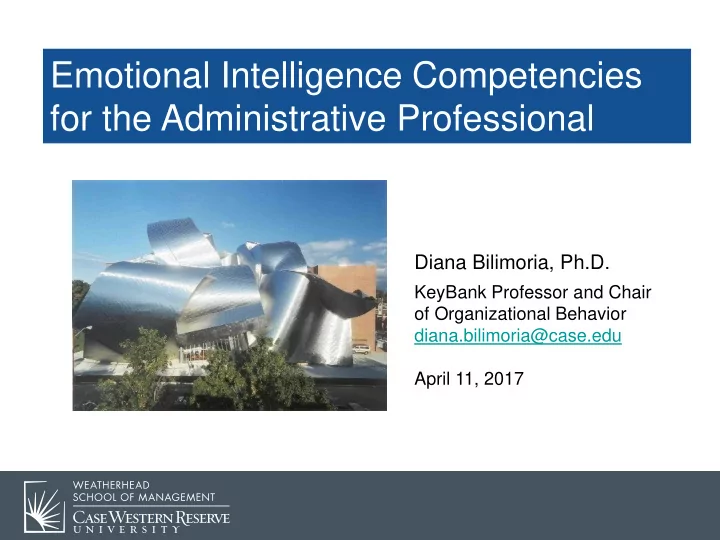

Emotional Intelligence Competencies for the Administrative Professional Diana Bilimoria, Ph.D. KeyBank Professor and Chair of Organizational Behavior diana.bilimoria@case.edu April 11, 2017
A Special Thank You! Shannon Swiatkowski Theresa Grigger Planning Board of the 2017 CWRU APN Conference Jean Seneff Girl Scouts Troop #91296 and Troop Leader Jennifer Dye Girl Scouts of North East Ohio Bob Hall and Carolyn Gregory Suzanne Healy 2
Objectives Define Emotional Intelligence (EI) and its competencies Understand how outstanding professionals harness the power of positive emotions to produce desired work outcomes Identify strategies for deploying EI in your professional and personal lives 3
Defining Emotional Intelligence Ronald Reagan https://www.youtube.com/watch?v=Qa7icmqgsow Robert Kennedy https://www.youtube.com/watch?v=j6mxL2cqxrA Discussion Questions: What are your reactions to these speeches? Write down your collective definition of emotional intelligence. 4
What is Emotional Intelligence? The capacity to recognize and understand your own and others’ emotions, and use this awareness to motivate and manage yourself and your relationships with others to result in improved work performance and enhanced organizational effectiveness 5
The Essence of Emotional Intelligence Understanding Yourself Awareness Skills Understanding Others Managing Yourself Management Skills Managing Relationships 6
EI Competencies: How Emotional Intelligence Drives Performance Self Others Awareness Self Social Awareness Awareness Actions Self Relationship Management Management Positive Impact on Others 7
Pairs Discussion Which areas of EI competency are your strengths? 8
Analyzing Bosses Exercise Characteristics of Characteristics of Great Boss Lousy Boss 9
Lessons from the 2 Videos: What We Know about Emotionally Intelligent Professionals They acknowledge today’s problems and simultaneously recognize opportunities and create solutions for the future Their actions resonate with the core values and larger purpose of their organizations, units and people They act with courage and integrity They build the relationships that are needed to deliver results over the long term They mobilize the resources necessary to engender success They understand and leverage the power of positive emotions to inspire desired outcomes such as excellent performance, creativity, initiative, and engagement 10
The Challenge for Professionals To unleash the best in self and others particularly in uncertain or difficult times To create a contagion of positive emotions including inspiration, creativity, and engagement To overcome unproductive emotional spirals in self and others (anxiety, anger, fear, despair, cynicism, confusion, victimhood, blaming) To gain perspective on the situation and the things we can influence To set an example of desired behaviors 11
The Neuroscience Behind Emotional Intelligence How our brain responds
The Emotional Process Neo-Cortex (most recent evolution – Thalamus complex thought) (processes sensory messages) Emotional Awareness of Behavior Arousal Situation Amygdala (triggers emotional response) 13
An Amygdala Hijacking • It is a sudden, emotional “default” response • It stirs strong emotions within you • The response is often manifested in some visible way • Afterwards you may feel embarrassed, sheepish, guilty, or regretful 14
Tell-tale Signs of An Emotional Hijacking: Common Emotional Reactions/Behaviors Justify/ Become Get Mad Blame Judge Attack Rationalize Anxious Be Become the Avoid or Laugh or Withdraw/ Argue Defensive Deny Joke “Protector” Run Away Become the Stew Demand Sulk Retaliate Victim 15
Individual Reflection: A Recent Amygdala Hijacking 1. Recall a recent episode in which you experienced an amygdala hijacking. 2. What set it off? What fed it or kept it going? 3. What physical, mental and emotional reactions/behaviors did you have? 4. How did it end? 16
Small Group Discussion Briefly discuss your amygdala hijacking episode Identify common patterns among your stories Identify other behaviors which would have been more effective to use in your episode. How will you remember to engage in these new behaviors in-the-moment? 17
Some Tips for Acting with More Emotional Intelligence in Difficult Situations Do the prep – this allows you to remember your “best self” in the moment Acknowledge emotions/feelings Get to the balcony Listen Put yourself in their shoes Interact with respect Take appropriate responsibility Invite engagement in finding creative solutions 18
Recap of the Core Message (1) Outstanding professionals harness the power of positive emotions to engage and resonate with others and build positive outcomes Ronald Reagan Robert Kennedy (2) Outstanding professionals create workplace cultures that are emotionally enriching – that manifest positive interaction, work-life quality, innovativeness, meaningfulness of work, and human development Your “great boss” (3) Outstanding professionals prepare themselves physically, mentally and emotionally for emotionally intelligent behavior in uncertain or difficult times Amygdala hijacking exercise 19
Concluding Thought “People may forget what you said. People may forget what you did, but people never forget how you made them feel.” - Maya Angelou, author and poet 20
Recommended Readings Goleman, D., Boyatzis, R. E., & McKee, A. (2002). Primal Leadership, Harvard Business School Press. Goleman, D. (1998). Working with Emotional Intelligence. Bantam Books. Boyatzis, R.E., & McKee, A. (2005). Resonant Leadership. Harvard Business School Press. 21
Recommend
More recommend